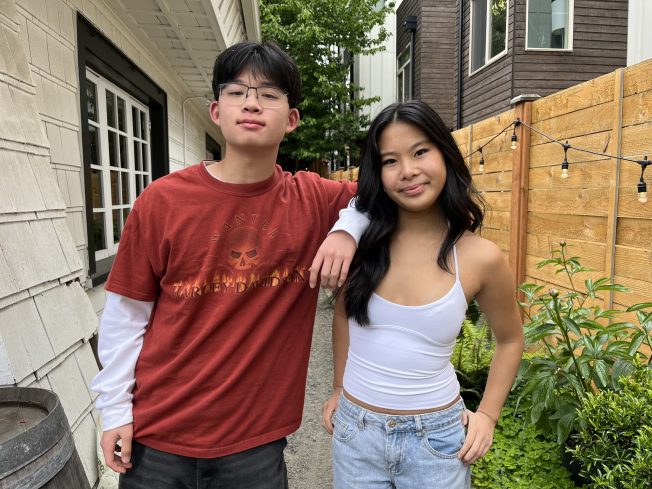By Anne Higuera
Reporting for West Seattle Blog
While most high-school students in West Seattle were busy counting down the days until summer break, fraternal twins Ari and Khalil Taw were just as eagerly counting the days until the new school year starts for them, at campuses almost halfway around the world. They are heading to Eastern Europe and Western Asia, respectively, having both earned a coveted spot in a program focused on what may best be described as world peace. It involves leaving their parents, friends, and each other for two years, in exchange for an extraordinary opportunity.
“My head’s in the clouds right now,” says Khalil, who will live in the Northern Armenia town of Dilijan. He and Ari, who will study in Mostar in Bosnia and Herzegovina, were selected as Davis Scholars with the United World Colleges (UWC). While college is in the name, UWC is a high-school program with 18 schools on 4 continents, and only one in the US — in Montezuma, NM. While UWC is functionally a boarding-school program, it intentionally brings together teens from disparate backgrounds to learn from each other for the betterment of the planet.
UWC was founded in the 1960s in the UK, with a goal of cultivating peace and understanding through education. By being in a classroom together, students from dozens of countries would see not just their differences, but the many things they have in common, and start to understand each other’s perspectives, leading to empathy, collaboration, and ideally, a future with less conflict. Over the years, UWC has grown to global prominence and widened its impact, counting now-King Charles, Nelson Mandela, and Queen Noor of Jordan among its presidents, the latter having served since 1995.
“It’s the best-kept secret in the US,” says Carl-Martin Nelson, UWC’s Director of Communications, who says that’s in part because UWC spends available funds on scholarships rather than marketing. “Our admissions model is different from any other school. We recruit for idealism in a way, unabashedly,” he says, explaining that they might have one full scholarship and one half-scholarship available for a country like Egypt or Venezuela. Each of those countries has a national committee that is then charged with finding students who they think would be a good match for the school. A three-stage application process follows, one that both Ari and Khalil found intense and sometimes intimidating, particularly knowing that only a very small percentage of applicants are accepted. “I became scared through the stages. I was unsure if I was going to fit in because a lot of people are very much one type,” says Ari. “I really do care about my academics, but I’m creative-focused. I think I have this little impostor syndrome. Do I really belong here?”
After the twins completed the third stage, a visit to the American UWC campus in New Mexico earlier this year, the answer was yes for both of them. Then the question was where in the world would they be going to school. UWC allows incoming students to list their top 3 choices and the majority of them put Italy first. Ari asked for Mostar, and got it. “I’m really interested in post-conflict societies,” she says. “That’s what drew me to Mostar — that there are three ethnicities. I wanted to see how they’ve reconciled [after the war in the early 1990s]. I really care about immigration and how people view immigrants. I don’t have clear-cut goals, just helping people.”
Khalil’s interests are more varied, but are centered around equity and access, particular when it comes to natural resources and recreational open space, which he has noticed is often utilized along lines of class and race. “You’re mostly seeing people of higher income, and white. A lot of people can’t appreciate national parks [because of a lack of] transportation, gear, money. There’s so much blocking everyone off from the outdoors.” Khalil thinks his time in Armenia will shape his ideas about how he can bring about positive change. “I want to go into politics, environmental equity, policies, cutting off corrupt international trade. Right now I have so many political tangents. At UWC I‘m going to find out what I’m really going to make a change in.”
Though American policies around travel and immigration are in flux, neither of the Taws is particularly worried about being out of the country for the rest of their high school education. But they both mentioned the big change of leaving their family home at 16 and the impact it will have on their parents. “They’re losing both of their kids. I’ll never live with them again,” predicted Ari. Their dad, Harold Taw, said with a smile, “My wife and I were a lot more supportive of their departure from home 2 years early when we thought it wasn’t a realistic possibility.”
Soon the last days of their sophomore-year classes at Seattle-area schools (Holy Names for Ari and Downtown School for Khalil) will be just a distant memory, and the twins will be on planes with different destinations. Orientation starts at the end of August and Ari’s will include a canoe trip with other students, an activity that will require everyone to pitch in together, something both twins know is exactly what they signed up for. “The beauty of UWC is the friendships you make across cultures— a person from each continent,” Khalil says, “The idea that world peace starts with kids, education… is the most important thing. People hate each other until they talk face to face. [That’s when] you see that someone feels just like you. It’s going to be messy, but also, it’s kind of beautiful.”


| 12 COMMENTS